 Petzlover
Petzlover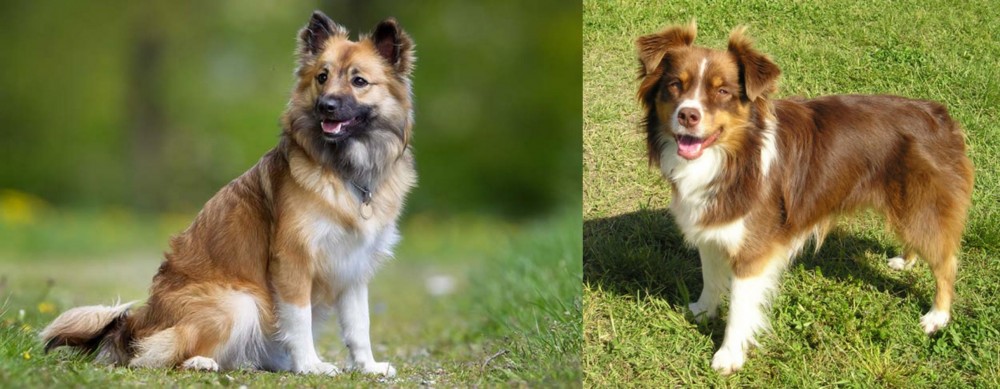 Icelandic Sheepdog is originated from Iceland but Miniature Australian Shepherd is originated from United States. Both Icelandic Sheepdog and Miniature Australian Shepherd are having almost same height. Both Icelandic Sheepdog and Miniature Australian Shepherd are having almost same weight. Both Icelandic Sheepdog and Miniature Australian Shepherd has almost same life span. Both Icelandic Sheepdog and Miniature Australian Shepherd has almost same litter size. Both Icelandic Sheepdog and Miniature Australian Shepherd requires Moderate Maintenance.
Icelandic Sheepdog is originated from Iceland but Miniature Australian Shepherd is originated from United States. Both Icelandic Sheepdog and Miniature Australian Shepherd are having almost same height. Both Icelandic Sheepdog and Miniature Australian Shepherd are having almost same weight. Both Icelandic Sheepdog and Miniature Australian Shepherd has almost same life span. Both Icelandic Sheepdog and Miniature Australian Shepherd has almost same litter size. Both Icelandic Sheepdog and Miniature Australian Shepherd requires Moderate Maintenance.
 There are quite a few different dog breeds that fall under the name of Spitz-type dogs, and in fact they have a number of similar characteristics, one of which is that they have some wolf-like features. They typically have the thick coat with undercoat and the erect, pointed ears and slanted eyes.
There are quite a few different dog breeds that fall under the name of Spitz-type dogs, and in fact they have a number of similar characteristics, one of which is that they have some wolf-like features. They typically have the thick coat with undercoat and the erect, pointed ears and slanted eyes.
There is definitely a strong link between the Spitz type dogs and wild wolves. The tail too is feathery and can curl over the back of the dog.
The Icelandic Sheepdog, a native dog to Iceland, is a Spitz type dog which originates from the dogs brought to Iceland by the Vikings. The dogs have always been used to herd sheep, and they resemble dogs found in graves in Sweden and Denmark.
The dog at one time was facing extinction in the late 20th century, but in 1969, the Icelandic Dog Breeder Association was established to restore and preserve the breed. The Icelandic Sheepdog gained AKC recognition in June 2010.
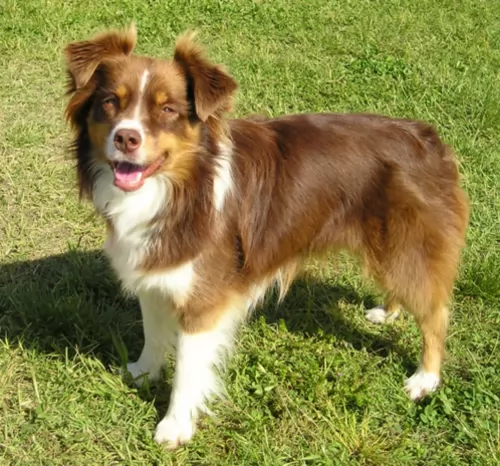 Unlike some miniaturized pure dog breeds, the Miniature Australian Shepherd is a breed of its own. The American Kennel Club and the United Kennel Club recognize that the miniature Australian Shepherd is the same as the miniature American Shepherd.
Unlike some miniaturized pure dog breeds, the Miniature Australian Shepherd is a breed of its own. The American Kennel Club and the United Kennel Club recognize that the miniature Australian Shepherd is the same as the miniature American Shepherd.
Certain breeding programs to develop the Miniature Australian Shepherd have been established and this dog is a small version of the Australian Shepherd. You can say that the Mini Australian Shepherd was developed in the 1960s and hails from the USA. American ranchers bred small Australian Shepherd dogs to create smaller replicas of the breed.
 The Icelandic Sheepdog is a smallish to medium sized dog standing at 40 to 45cm in height and he can weigh anything between 9 and 14kg.
The Icelandic Sheepdog is a smallish to medium sized dog standing at 40 to 45cm in height and he can weigh anything between 9 and 14kg.
His double coat can be short or long, straight or wavy and in a mix of colors such as grey and white or tan and white, black, tan and white, cream or chocolate. Even though they come in a number of predominant colors, these colors are always accompanied by white markings.
He has a longish muzzle, much like the wolf, giving him an alert, foxy appearance. He has a muscular, rectangular body with strong, straight legs with dewclaws on both the front and hind legs.
Your social, energetic dog will require socialization and training which does him the world of good, turning him into a well-adjusted, obedient dog.
He is an intelligent dog, and training him won't be difficult as he is eager to please. These are social dogs which love being part of the family and they don't like being left outside day after day with little human intervention. He is a lively, confident breed, gentle and not at all aggressive.
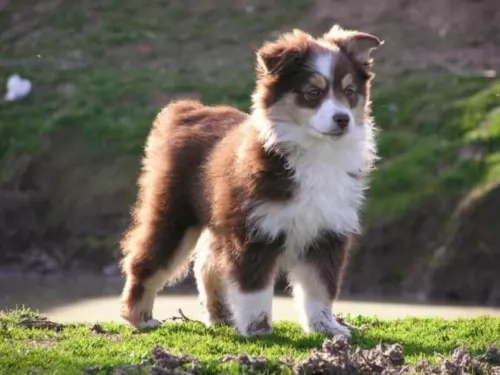 The Miniature Australian Shepherd’s coat is medium-length and is straight or wavy. It comes in a range of colors such as blue or red merle and red or black tricolor. There are white or tan markings as well. He is a small dog, standing at 33 - 46 cm in height and weighing 6 – 16kg.
The Miniature Australian Shepherd’s coat is medium-length and is straight or wavy. It comes in a range of colors such as blue or red merle and red or black tricolor. There are white or tan markings as well. He is a small dog, standing at 33 - 46 cm in height and weighing 6 – 16kg.
They have blue or brown eyes but some will even have one eye blue and the other brown. The ears are semi erect, semi floppy and the tail, while essentially left long and feathery, is sometimes docked.
Miniature Australian Shepherds are easygoing dogs who love being with their human families. They get on well with children in the home and are always willing to jump right in for a game.
They’re lively and agile and if its not games they’re busy with, they want to be on a walk. They’re loving and loyal and also eager to please, sensing what their owner wants.
They’re intelligent dogs too and easy to train so it is sure to go well with training and socialization, which is important for any dog. This training and socialization can actually help with problems a dog has such as being very nervous or being too active indoors. They become obedient and manageable wherever they are.
He is also willing to get on with other pets in the house. Just like the larger dog, the mini Australian Shepherd loves to be active and at work.
 The Icelandic Sheepdog is such a good all-round family pet. He is alert, intelligent, social, playful, loyal, loving and brave.
The Icelandic Sheepdog is such a good all-round family pet. He is alert, intelligent, social, playful, loyal, loving and brave.
He is friendly too, getting on well with children and any pets you have in the home. He is essentially a working dog, so you shouldn’t think of owning him as a pet if your lifestyle is centered around the TV and the couch for the best part of the day.
This is an energetic dog who wants lots of action during the day. He is a dog that badly wants to be part of the family and in exchange for looking after him well, he’ll promise to be an exceptional pet.
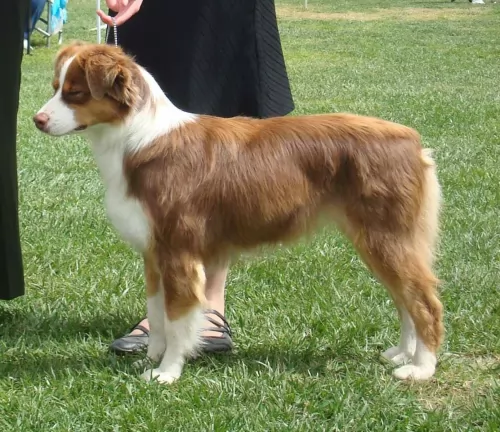 The wonderful friendly nature’s of these dogs make them excellent family pets, especially when they have been trained and socialized. They can live in the city or country but they will certainly require being exercised as they are an active breed, wanting to be busy with his human family.
The wonderful friendly nature’s of these dogs make them excellent family pets, especially when they have been trained and socialized. They can live in the city or country but they will certainly require being exercised as they are an active breed, wanting to be busy with his human family.
You can’t describe these dogs as low maintenance as they have long, thick hair that sheds and which will also need to be brushed regularly.
If you’re able to provide a good home for this beautiful, lively dog, then he will make you a splendid pet.
 Your pet will reach 12 to 14 years of age with good care and is regarded as a generally healthy dog breed. However, they can be prone to a few health conditions, and these include hip dysplasia and diabetes.
Your pet will reach 12 to 14 years of age with good care and is regarded as a generally healthy dog breed. However, they can be prone to a few health conditions, and these include hip dysplasia and diabetes.
Mercifully for your pet, diabetes is considered a manageable disorder. When your pet doesn’t produce insulin or can’t utilize it normally, his blood sugar levels rise, resulting in hyperglycemia.
If left untreated, your pet can land up with a host of complicated health problems. Diabetes can be classified as either Type 1 or Type II, with the more common form in dogs being Type 1.
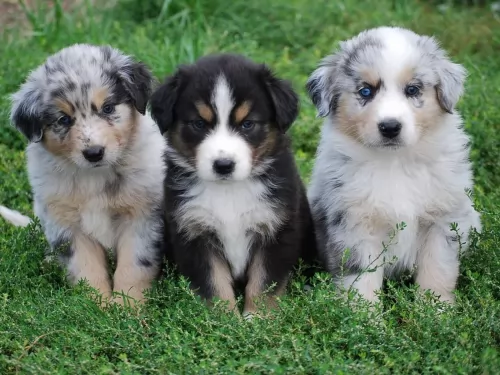 Your Miniature Australian Shepherd can enjoy good health if you make sure he has a nutritious diet, he is well exercised and he is happy and content because of the attention you give him. He can easily reach 13 years of age.
Your Miniature Australian Shepherd can enjoy good health if you make sure he has a nutritious diet, he is well exercised and he is happy and content because of the attention you give him. He can easily reach 13 years of age.
Also, say what you like, human beings constantly tampering with animals to produce certain looks has its drawbacks and can create health problems in dogs.
As a pure breed however, these dogs will be more susceptible to some common canine health problems such as hypothyroidism, patellar luxation, obesity, hip dysplasia, vision problems and cancer.
 Feed your energetic Icelandic Sheepdog a diet which is appropriate for his age and activity level. Don't just feed him the best commercially manufactured dog food, but give him some cooked chicken, brown rice and vegetables mixed into his kibble as a tasty treat. Also, dogs are carnivores, so include some raw meat into his diet from time to time. Clean, cool water should always be available.
Feed your energetic Icelandic Sheepdog a diet which is appropriate for his age and activity level. Don't just feed him the best commercially manufactured dog food, but give him some cooked chicken, brown rice and vegetables mixed into his kibble as a tasty treat. Also, dogs are carnivores, so include some raw meat into his diet from time to time. Clean, cool water should always be available.
The Icelandic Sheepdog has a thick double coat, with the outer coat being longer and the hair being shiny and glossy. These dogs shed quite a bit with seasonal shedding too so twice-weekly brushing will be necessary to keep the fur free of loose hair. His nails should also be checked regularly and his teeth should be brushed a couple of times a week too.
Icelandic Sheepdogs are athletic, active dogs that require a lot of exercise to keep them in good physical shape.
He loves all kinds of games and outdoor activities, one of which will be going with you for a walk every day. He makes a wonderful companion for those people going on long hikes.
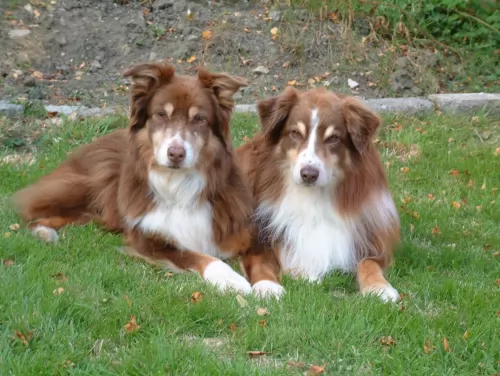 The mini Australian Shepherd has a long coat with seasonal shedding. You will need to give the coat a good brush twice a week to keep it untangled and to remove loose hair.
The mini Australian Shepherd has a long coat with seasonal shedding. You will need to give the coat a good brush twice a week to keep it untangled and to remove loose hair.
Other grooming for your pet will be to check his eyes and ears for infection, check for unusual lumps when you brush him and check for fleas and ticks. Keep his nails trimmed and brush his teeth 2 or 3 times a week to avoid plaque build up.
If you’re wondering how to keep your dog well groomed for the enhancement of this health, people such as your vet or professional groomers will do these grooming tasks for you.
Top quality commercially manufactured dog food packed with vitamins and minerals needs to be your choice if you're going to be using these dog foods. Avoid the cheaper brands that use lots of fillers, sugar, salt, colorants and preservatives.
Home-made food is a wonderful treat for a dog and delicious, nutritious and simple ingredients such as boiled chicken, brown rice or pasta and some cooked vegetables chopped up into his dry kibble from time to time will do him wonders.
Sometimes it will also be good to add in a little bit of raw meat too. Make sure there is a bowl of fresh, cool water available to your pet constantly.